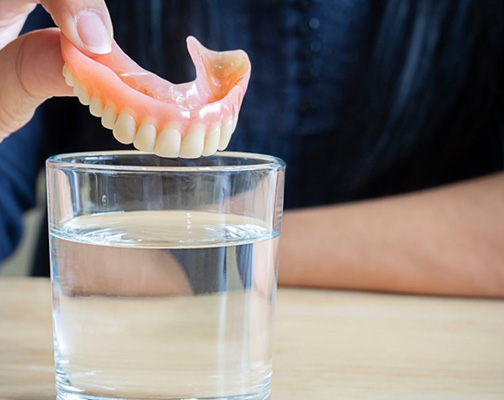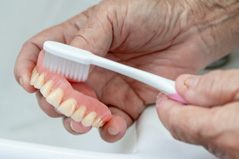Dentures — Brookline, MA
Missing Several Teeth? We Can Restore Them
The more teeth you lose, the more of an impact it will have on your ability to function in everyday life. You won’t be able to chew your favorite meals, and even something as simple as speaking will be difficult. Fortunately, there’s an easy way to compensate for extensive tooth loss: simply schedule an appointment to ask our Boston Smile Center team about getting dentures in Brookline! With just one affordable prosthetic, you’ll be able to enjoy the benefits of a full smile again.
Why Choose BOSTON SMILE CENTER for Dentures?
- Dental Implants Placed & Restored In-House
- Dentist Certified in Oral Implantology
- Custom Designed Down to the Finest Detail
Who’s a Good Candidate for Dentures?

If you've lost multiple or all of your teeth, dentures might be the ideal solution for restoring your smile. These custom-made prosthetics are a quick and effective way to replace missing teeth, allowing you to regain a full and healthy smile. During your consultation, our team at Boston Smile Center will assess your smile and review your medical history to determine your candidacy. Meanwhile, here are some key points to consider as you explore the possibility of dentures.
Effects of Missing Teeth
There are several factors, including tooth decay, gum disease, and trauma, that can lead to tooth loss. The negative consequences of missing teeth are significant, as highlighted by the American Academy of Periodontology. Individuals with missing teeth often encounter issues such as facial sagging, speech difficulties, challenges in eating, and a decline in self-esteem. Addressing tooth loss is crucial not only for oral health, but also for overall well-being and confidence.
What Qualifies You for Dentures?
Dentures prove to be an excellent solution for individuals with substantial tooth loss. Commitment to dental health is crucial for maintaining the well-being of your smile with dentures. The choice between partial and full dentures depends on the extent of tooth loss.
One significant benefit of dentures is their affordability, making them a practical choice for those seeking cost-effective tooth replacement. This accessibility ensures that patients on a tighter budget can still achieve a restored and functional smile.
Alternative Tooth-Replacement Options
If dentures are not suitable for you, you can explore alternative tooth-replacement options, such as:
- Dental Bridges – These are ideal for patients with one or several missing teeth in a row. Dental bridges rely on adjacent healthy teeth to support the restoration.
- Dental Implants – Our team can insert implant titanium posts into your jawbone to provide support for new teeth. This option is suitable for individuals with a strong facial structure and sufficient bone density, offering long-lasting results despite a higher initial cost.
Learn More About Dental Bridges
Learn More About Dental Implants
Types of Dentures

Today’s dentures are more comfortable and reliable than ever before thanks to state-of-the-art dental materials and advanced design techniques and technology. There are actually several types of dentures available; our team will consider the number of teeth missing as well as the overall health of your gums and jaw before recommending one of the following three options.
Partial Dentures
A partial denture is used to replace one or multiple teeth. This is the best option for those who still have most of their natural teeth. Each partial denture is designed to slip into the gaps in an arch in a seamless way. Most of the time, the prosthetic will be held in place with a clasp attached to the natural teeth.
Full Dentures
Full dentures are the best choice for those who have already lost an entire row of teeth or don’t have enough healthy teeth to salvage. The prosthetic teeth attached to a full denture will be custom shaded and shaped based on the overall appearance of your smile and the rest of your face. Traditionally, full dentures simply rest on the gums and stay where they are thanks to suction.
Implant Dentures
Dental implants are the most advanced tooth replacement option available. Now you can anchor your dentures to your jaw with the help of titanium implant posts. This helps minimize unwanted movement and keeps the underlying bone tissue healthy.
How Dentures Are Made

If you are interested in replacing your missing teeth with dentures, you may be curious about what the process looks like. Dentures are customized to fit your unique smile, so they require multiple steps to achieve the final results. Continue reading to learn what makes up your dentures and how the creation process works.
What Are Dentures Made Of?
Dentures are made up of two main parts. Here is what each one consists of:
- Base: The base of the denture is the foundational structure that supports the replacement teeth. It can be made from a variety of different materials, including acrylic, nylon, and resin. Most of the time, acrylic is used because it can be easily tailored to match your natural gum tissue. Partial dentures may use metal clips with an acrylic base.
- Replacement Teeth: The replacement teeth are attached to the denture base. They are usually made from either resin or porcelain because they both have a natural appearance. However, porcelain is more popular because it looks and feels just like natural tooth enamel. It is also extremely durable.
The Denture Creation Process
Dentures are custom-made for each patient. Here is how the magic happens:
- Your dentist will take measurements of your jaw and impressions of your mouth. This way, a model can be created to match the exact size and shape of your mouth. This model will be used to ensure that your final denture perfectly fits your unique smile.
- The model is sent to a dental laboratory. This is where your dentures will be made. They will begin by creating a wax replica of your gumline.
- The replacement teeth will be set in place using a mechanical device called an “articulator.” Adjustments will be made by the technician.
- Your wax dentures will be sent back to the dental office for a fitting. If they look good, your dentist will return them to the dental lab.
- Once back at the lab, the technician will place your dentures in a flask. Plaster is poured in to maintain their shape. The entire flask is placed in hot water to melt away the wax portions.
- Holes are made in the teeth and acrylic is injected into the flask to replace the wax.
- The plaster is carefully removed from the denture using special tools. The dentures are placed in an ultrasonic bath to clean the rest of the plaster off.
- Excess acrylic is cut from the denture. The denture is then polished to perfection.
- Now that the denture is complete, it will be sent back to your dentist. You will return to the practice for a fitting. If everything looks and feels great, you can now enjoy the benefits of your new smile!
Adjusting to Your New Dentures
You may feel some slight soreness and discomfort when you first get your dentures, but this is perfectly normal and temporary. With a little bit of time, your mouth will adjust, and your dentures will begin to feel like natural teeth. Remember to stick to softer foods and exercise your facial muscles during this time. If discomfort persists or you have any concerns, don’t hesitate to give us a call so we can help.
The Benefits of Dentures

Losing multiple teeth can make everyday tasks difficult, such as chewing, speaking clearly, and smiling confidently. Fortunately, dentures offer a transformative solution for patients missing several or all of their teeth, significantly enhancing their quality of life. If you've experienced tooth loss, dentures can rejuvenate your smile and provide numerous benefits. Click on the button below to learn more!
Psychological Benefits

It&Patients who have lost their teeth may struggle to come to terms with their tooth loss, which can impact their self-esteem and social interactions. Those who feel insecure about their tooth loss may withdraw from social activities, increasing the chances of experiencing feelings of sadness and depression.
By restoring the appearance and function of their smile with dentures, patients can experience a boost in confidence. Dentures alleviate concerns about appearance, speech clarity, chewing ability, and more, leading to a more positive outlook on life.
Clearer Enunciation

Speaking becomes more challenging when teeth are missing because proper pronunciation relies on the correct positioning of the lips and tongue. Without the ability to touch the tongue to the teeth, certain words may be hard to articulate clearly.
Fortunately, dentures act as replacements for missing teeth, allowing wearers to enunciate more clearly when speaking. With a brief adjustment period and practice, speaking will become natural once again.
Improves Nutrition

Several nutritious foods, such as vegetables, fruits, and proteins, have a tough texture. However, tooth loss can hinder thorough chewing, leading to problems like indigestion or malnutrition. By enhancing chewing ability, dentures enable individuals to enjoy a wider variety of nutritious foods. This ensures that the body receives vital nutrients necessary for optimal overall health.
Preserves Oral Health

If you still have some natural teeth, opting for dentures can prevent them from shifting and causing complications in other areas of the mouth. Additionally, dentures help distribute some of the force during chewing, reducing the strain on your remaining natural teeth.
Expands Opportunity

Your smile is often the first thing people notice in social interactions, job interviews, and professional advancements. Having a great first impression can significantly impact success in areas such as career advancement and sales. A complete and confident smile plays a key role in this process, making you feel self-assured and approachable. In various aspects of life, sporting a complete smile serves as a valuable asset, enhancing one's overall confidence and opportunities for success.
Understanding the Cost of Dentures

Dentures today aren’t like the ones that your grandparents used to wear! They are customized for each patient, leaving you with a beautiful, one-of-a-kind set of pearly whites. Since everyone’s treatment is a little bit different, the cost can vary. During your consultation with us, we will discuss the expected cost of your treatment in detail so that you don’t run into any surprises. Until then, here are some things to take into account.
Factors That Affect the Cost of Dentures
There are multiple factors that play a role in the cost of your treatment. Here are some of the most prominent ones.
- Preparation: If you require preliminary procedures, like gum disease treatment or tooth extractions, you should consider these costs as well.
- Material: Dentures can be crafted from multiple materials. They are all set at different price points.
- Type of Denture: In most cases, the bigger the prosthetic, the higher the cost. Implant dentures are priced higher because they require a surgical procedure.
Are Implant Dentures More Expensive?
Implant dentures have a higher cost than traditional ones, and there is a good reason for this. Instead of being supported by the shape and suction of the mouth, implant dentures are supported by a number of strategically placed dental implants throughout the jawbone. This allows for additional stability, comfort, and longevity. To achieve this, getting dental implants requires a surgical procedure and many months of healing, making the cost higher. Implant dentures are made to last for many years or even the rest of your life!
Does Dental Insurance Cover Dentures?
Dental insurance providers usually consider dentures to be a major restorative procedure. This means that the treatment is typically covered at approximately 50% after the deductible has been met and before the maximum has been reached. However, every plan is a little bit different, so it is best to confirm this with your provider ahead of time. At Boston Smile Center, we are proud to be a participating provider with many leading dental insurance carriers, including Delta Dental, Cigna, BlueCross BlueShield, Altus, and Guardian.
Other Options for Making Dentures Affordable
If you don’t have dental insurance, this doesn’t mean that you are completely out of luck. We are happy to accept payments through CareCredit – a third-party financing company that can split the cost of your treatment into manageable monthly installments with little to no interest. If you have any questions or need help applying, don’t hesitate to contact us!
Dentures Aftercare

Like most other physical objects, you’ll have to take good care of your dentures if you want them to last longer. Fortunately, denture maintenance is pretty simple; it’s just a matter of removing and cleaning them at the right times! Our team will be sure to review aftercare instructions with you before you leave the office, but if you’d like a sneak peek of what to expect, take a look at the information we’ve put together below.
Removable Dentures

Remove After Eating
After every meal, remove your dentures and give them a quick rinse in warm (not hot!) water. This will help dislodge any leftover food debris stuck underneath the base or between the teeth. Not only can food buildup produce foul odors if left to sit long enough, but it can also lead to harmful bacteria accumulation.
Clean Your Restoration
Your dentures should be cleaned more thoroughly at least once per day. You can do this with a soft-bristled toothbrush, but not toothpaste. Many of the ingredients in normal toothpaste are abrasive and can cause premature wear. Instead, scrub your dentures with dish soap or hand soap.
Keep Your Dentures Safe
If you leave your dentures out where small children and curious pets can reach them, they’re more likely to experience accidental breakage. When they’re not in your mouth, be sure to store them somewhere safe and secure.
It’s also a good idea to drape a towel over your countertop while you clean your dentures. That way, if you happen to drop them, they’ll be less likely to crack.
Remove When You Sleep
Believe it or not, your gums need to circulate and have time to “air out.” Otherwise, they could become infected or miss out on essential nutrients. A convenient time to give them a break from supporting your dentures is while you’re asleep. Take them out before you go to bed, and if you’d like, drop them in a denture cleaning solution so they’re easier to clean in the morning.
Notice Changes
This can include oral abnormalities such as sores or chafing, but also changes in how your dentures fit. Over time, your gums and jawbone will change shape, and your dentures may become loose. Fortunately, we can fix this for you quickly and easily!
Denture FAQs
Dentures in Boston have been a trusted solution to replace lost teeth for generations. They are a tried-and-proven method to restore a beautiful, complete smile; however, they are a big investment. We will take the time to explain everything during your consultation to feel confident about the road ahead. While you wait for your appointment, here are the answers to a few frequently asked questions.
Can I sleep with my dentures?
No one wants to be caught without their teeth, but you should only sleep with your dentures for the first night. Your denture dentist in Boston will advise you to wear them for 24 hours after receiving them, but then you’ll need to take them out. Blood circulation to your gums will be restricted while wearing your dentures, which can lead to tenderness, inflammation, and infection. Removing your new teeth at night allows your gums to get the nutrients they need to stay healthy. Not to mention, your mouth is dark and moist. It’s the perfect place for bacteria to multiply quickly, which can affect your oral and general health. It can also cause odors and damage to your denture. You can safeguard your health and investment by taking your dentures out at night. After you’ve cleaned them, store them in an overnight soaking solution to remove any bacteria left behind by your toothbrush. It will also keep them moist to prevent warping.
Does an upper denture always cover the palate?
A traditional upper denture covers the palate. Although it’s effective, it can be uncomfortable or diminish the way food tastes for some patients. You have other options. Dentures come in several styles, including palate-less options. An upper denture can have a horseshoe shape like a lower or implant denture. We will explain all your options to find the ideal style for your needs and preferences.
Do I use toothpaste to clean my denture?
While your dentures mimic your natural teeth, they can’t be cleaned the same way. Abrasive dental products, like a hard-bristled toothbrush or toothpaste, can leave small scratches on your dentures. The tiny crevasses can trap bacteria, which can compromise the durability of your new smile. It can also affect the aesthetics of your dentures. Instead, your denture dentist recommends using a soft-bristled toothbrush and mild hand soap or dishwashing liquid to clean them, but don’t use hot water because it can warp your dentures. You can also purchase cleaning products designed for dentures.
Can I eat steak with dentures?
Your dentures will closely mimic your natural teeth, but they have their limitations. While it is possible to eat steak, you’ll want to have it in moderation. Steak and other tough meats can be difficult to chew, which can put more wear and tear on your dentures. It can also lead to sores and inflammation. If you can’t resist a juicy steak, cut your food into small pieces to make it easier to chew. You can also use an adhesive for a little more stability when eating.

